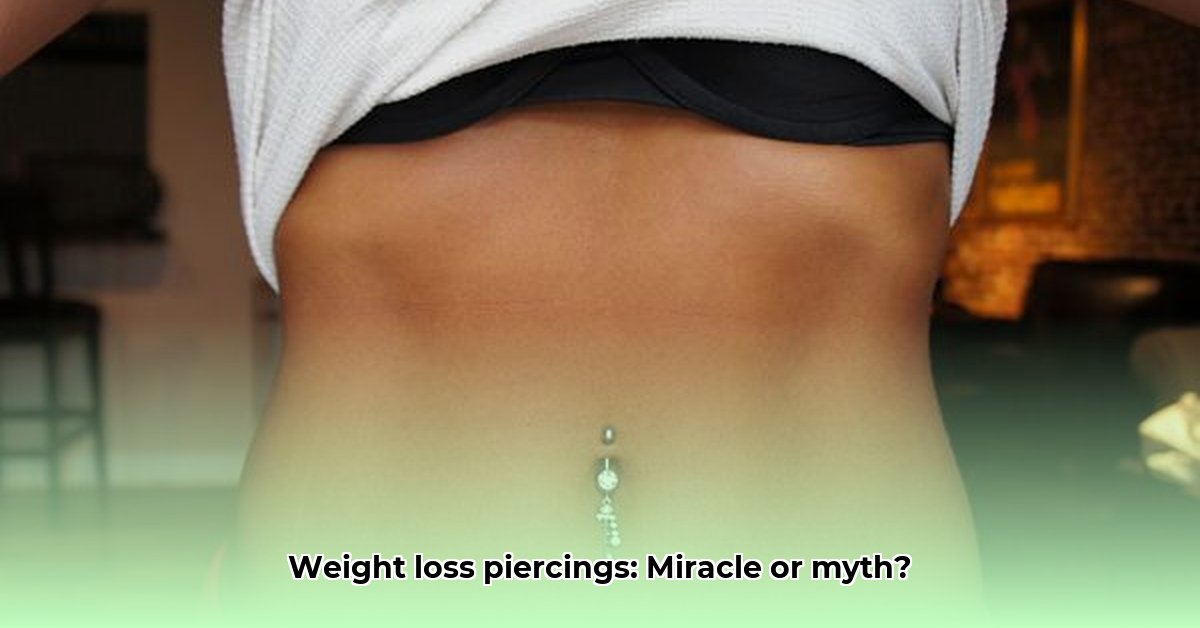
The purported ability of ear piercings, specifically daith and tragus piercings, to facilitate weight loss has gained traction, sparking debate among health professionals and consumers alike. This review examines the claims surrounding weight loss piercings, critically evaluating the supporting evidence and exploring potential risks.
The Allure and the Claims
The appeal of weight loss piercings stems from the promise of a simple, minimally invasive procedure yielding significant weight reduction. The underlying theory posits that stimulating the vagus nerve—via strategically placed piercings—influences appetite regulation and digestion. This nerve plays a crucial role in various bodily functions, and its stimulation is believed by some to potentially curb cravings, thereby promoting weight loss. However, this alluring concept lacks robust scientific validation.
The Science (or Lack Thereof)
Despite the plausible-sounding mechanism, definitive scientific evidence supporting a causal link between ear piercings and substantial weight loss is currently absent. Large-scale, well-designed studies are needed to demonstrate a clear, consistent association. Existing anecdotal reports, while interesting, cannot establish causality. Correlation does not equal causation; observing weight loss in individuals who have gotten piercings does not prove the piercing caused the weight loss. Numerous other factors—diet, exercise, genetics, stress levels—influence weight, making it challenging to isolate the effect of a piercing.
Limited Research and Inconsistent Outcomes
The limited research available exhibits highly inconsistent results. Reported success varies based on factors such as the precise piercing location, the piercer's skill, and individual physiological responses. Furthermore, the potential for infection introduces a significant confounding factor. While some individuals report improvements in mood or stress levels—factors that could indirectly influence eating habits—the connection remains tenuous and requires extensive further investigation. Does the perceived improvement in mood lead to better dietary choices? More research is needed to answer this question definitively.
Risks Associated with Weight Loss Piercings
Weight loss piercings are not a risk-free endeavor. Potential complications include:
| Risk Category | Severity | Likelihood | Mitigation |
|---|---|---|---|
| Infection | Moderate | Moderate | Choose a licensed and reputable piercer; meticulous aftercare; immediate medical attention for any signs of infection. |
| Pain/Discomfort | Low to Moderate | High | Realistic expectations; pain management strategies discussed with the piercer. |
| Unsatisfactory Results | Moderate | High | Realistic expectations; exploration of healthier alternatives if results are not achieved. |
| Scarring/Keloid Formation | Low | Low | Proper aftercare; early attention to complications can reduce scarring. |
| Financial Loss | Low | High | Thorough cost assessment; comparison to cost-effectiveness of proven weight loss strategies. |
These risks need careful consideration before undergoing the procedure.
Proven Methods for Weight Management: A More Reliable Path
Sustainable weight management hinges on evidence-based strategies. A balanced diet and regular physical activity remain the cornerstones of successful, long-term weight loss. These approaches are supported by extensive research and consistently produce reliable results. Is it worth risking complications for a treatment with limited evidence of success, when reliable, effective methods are readily available?
How Effective Is Ear Piercing for Weight Loss Based on Scientific Evidence?
Key Takeaways:
- Anecdotal reports exist, but robust scientific backing is lacking.
- Large-scale studies are needed to establish efficacy.
- The placebo effect might contribute to some reported weight loss.
- Ear piercing carries inherent risks, including infection.
- Lifestyle changes remain the most effective approach to sustainable weight management.
The Bottom Line: Prioritizing Evidence-Based Approaches
While the concept of weight loss piercings is tempting, the scientific evidence supporting its effectiveness remains incredibly weak. Individuals seeking weight loss should prioritize evidence-based strategies such as balanced nutrition and regular exercise, proven to yield sustainable results. Consider ear piercing only within the context of a holistic, health-professional-guided approach to weight management, and only after a thorough risk-benefit analysis.